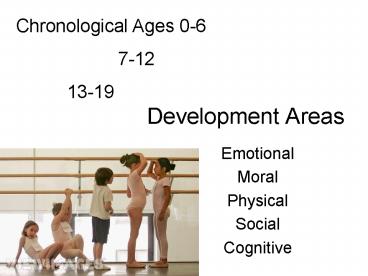Development Areas - PowerPoint PPT Presentation
1 / 14
Title:
Development Areas
Description:
Chronological Ages 0-6 7-12 13-19 Development Areas Emotional Moral Physical Social Cognitive Basic Processes of Development Maturation Biological process of ... – PowerPoint PPT presentation
Number of Views:118
Avg rating:3.0/5.0
Title: Development Areas
1
Development Areas
Chronological Ages 0-6 7-12
13-19
- Emotional
- Moral
- Physical
- Social
- Cognitive
2
Basic Processes of Development
Developmental Psychology
- Maturation
- Biological process of systematic physical growth
- Experience plays role in specific contexts
Red indicates more gray matter, blue less gray
matter.
3
Early Experiences and Critical Periods
Developmental Psychology
- Imprinting (Lorenz)
- Inborn tendency or instinct
- Sensitive period critical period
- Early social deprivation
- Harlows monkeys, social isolation, and
continuing detrimental effects - Controversy over effects on children
- Some abnormal effects may be irreversible
4
Developmental Psychology
Piagets cognitive development theory
Birth to 2 yrs Sensorimotor Uses senses and motor skills, items known by use Object permanence
2 - 7 yrs Pre-operational Symbolic thinking, language used egocentric thinking, imagination/ experience grow, child de-centers
7 - 11 yrs Concrete operational Logic applied, objective/rational interpretations conservation, numbers, ideas, classifications
11 yrs on Formal operational Thinks abstractly, hypothetical ideas ethics, politics, social/moral issues explored
5
Developmental Psychology
Eriksons Psychosocial theory
6
Marcias Theory of Personal Identity
- James Marcia - examined development
of personal identity. - Identified four main approaches
to developing a sense of identity - achievement
- foreclosure
- diffusion
- moratorium
7
Sexual and Gender Development
- Sex - Physiologically Determined
- Gender - Psychologically Determined
- Sexual Development - Increasing Awareness of sex
differences - Gender Identification - Acquiring sex roles
- Androgyny - Displaying both expressive and
instrumental qualities
8
Theories of Sexual and Gender Development
- Biological Development
- Freuds Theory of Psychosexual Development
- Behaviorism
- Social Leaning Theory
- Schema Theory
- Homosexuality
http//myspacetv.com/index.cfm?fuseactionvids.ind
ividualvideoid7504339
9
Social Development
Harlow
Ainsworth
- Attachment - strength and kind of bond that
exists between people. - Avoidant Attachment
- Secure Attachment
- Resistant Attachment
- Friendship and Play
- Unoccupied
- Solitary
- Onlooker
Play Stages
- Parallel
- Associative
- Cooperative
10
Developmental Psychology
Early Childhood
Cooperative play
Parallel play
Solitary play
11
Moral Development
- Moral Development - process of acquiring sense of
right and wrong. - Piagets Theory of Moral Development
- Moral Realism
- Morality of Cooperation
- Kohlberg
- Moral Dilemmas
12
Developmental Psychology
Kohlbergs theory of moral development
Level I Preconventional moral reasoning Stage 1 might makes right Punishment/obedience orientation self-interest
Level I Preconventional moral reasoning Stage 2 look out for number one Instrumental/relativist orientation quid pro quo
Level II Conventional moral reasoning Stage 3 good girl, nice boy Proper behavior for the social approval
Level II Conventional moral reasoning Stage 4 law and order Proper behavior of the dutiful citizen, obey laws
Level III Postconventional moral reasoning Stage 5 social contract Mutual benefit to all, obey societys rules
Level III Postconventional moral reasoning Stage 6 universal ethical principles Defend right/wrong, not just majority, all life is sacred (reflective)
13
Gilligans Theory
- An alternative theory of the moral development of
women. - Empathy
- Competition Versus Cooperation
14
Evaluating Kohlbergs Theory
- Criticisms of Kohlbergs Theory
- Subjective Scoring
- Lack of Stage Specificity
- Inconsistencies between Thoughts and Actions
- Originally Validated on White, Middle-class, Males































